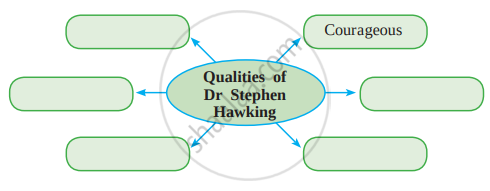Advertisements
Advertisements
प्रश्न
| Expand the given themes | Make use of this support/hints |
| If you meet a disabled person who needs help |
- Act/behave - Contact whom? |
उत्तर
If you meet a disabled person who needs help:
If I meet a disabled person who needs help, I will try and help him out without making him feel dependent. First, I will ask him whether it is okay if I help him out. Then I will help him while chatting with him so that he doesn’t feel like he is depending on someone for a particular thing. If it is a long-term help that the person needs, I would contact an NGO that could come to the person’s aid.
APPEARS IN
संबंधित प्रश्न
A Strange Truth - ‘Handicapped are those who refuse to take up challenges, even with all their senses and physiology in perfect condition.’
- Understand and discuss the above truth.
- How can you encourage such people to change and become confident? Discuss at least 4 to 5 ways you can do the above.
Match the following.
| Group A | Group B | ||
| 1. | Galileo | (a) | the concept which helped Stephen to get his Ph.D. |
| 2. | Dr. Stephen Hawking | (b) | music and mathematics. |
| 3. | Black Holes | (c) | the greatest scientist of this century. |
| 4. | Stephen’s favourite subjects | (d) | the greatest scientist 300 years before Hawking. |
Complete the following web chart containing the qualities of Dr. Stephen Hawking.

Arrange the following statements according to the occurrence in the life history of Dr. Stephen Hawking.
- At the age of 17, Stephen noticed that he fell down a couple of times for no reason.
- He became a fellow of the Royal Society and a member of the US National Academy of Science.
- He believes that in the next millenium, science will discover the core secrets of the universe.
- Stephen was born on 8th January 1942 and then grew up like an average child and a normal teenager.
- The disease worked its way into Stephen’s body and left him disabled.
- Stephen decided to continue his doctoral research work with renewed vigour.
- Stephen was diagnosed with a rare disease - ALS or LOU.
- Though confined to a wheelchair he worked on computer and expressed his thoughts.
| Expand the given themes | Make use of this support/hints |
| If you fall ill during your final exam | - First step/what to do support/help |
| Expand the given themes | Make use of this support/hints |
| If your friend is in trouble |
- Gestures/Body language Patience/Tolerance |
| Expand the given themes | Make use of this support/hints |
| If you meet a great person like Dr. Stephen Hawking |
- Plan/organise - Face/Handle/Overcome Succeed/accomplish |
There are pleasant and polite ways of referring to people with physical and mental disabilities. Fill in the table below:
| Previously used Term | New Polite Terms | ||
| 1. | ____________ | (a) | Visually challenged |
| 2. | Deaf | (b) | ____________ |
| 3. | ____________ | (c) | Speech impaired |
| 4. | mad | (d) | ____________ |
| 5. | lame | (e) | ____________ |
Read the beginning and complete the story in your own words:
Sumit, the son of a shoe maker, was a highly intelligent student in a municipal school. His Maths teacher called him ‘Einstein’, for he was brilliant in Maths. He loved Maths. Sumit wanted to study further after SSC, however, he suffered from Polio and .....
Now, continue the story with a favourable/positive ending.
